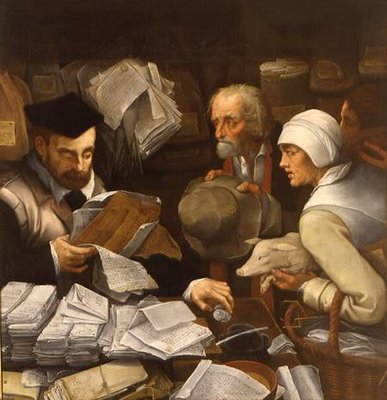Tax revolt? Taxes are one of the great icons of divisiveness that seem to date back to the beginning of antiquity, evolving their way from paganism, to monotheism without skipping a beat. Even the great religious thinkers like Aquinas, Thomas More and rabbi Akiba could come to no definite conclusion on taxes. Essentially, the schema has always remained the same: the market is to provide private goods like cell phones and cars and the state public goods like Old Age Security and national defense. With grey areas in-between. The debate over the most appropriate taxation scheme is intense and ideological, invoking religion as well since he ethics of taxation schemes are continually the subject of debate. especially over what is an articulable basis of fairness. At one extreme are those who claim that all taxes are essentially confiscatory, an unfair and probably illegal transfer of income to the state from its rightful owner, the citizen as opposed to various socialistic schemes…
But what if the will is willing, but the understanding is lacking to comply with what is decided? Einstein, arguably one of the great minds of the twentieth-century tried to file his own tax returns in compliance with the tax code. Granted, he did not possess Turbo-Tax, but after several days of diligently filling out forms, and following the arrows into the labyrinth of the complicated, arcane and even to Einstein esoteric and black art of the tax code, he decided it would be easier to discover the unified field theory than risk loss to reputation on a faulty income tax return. Hands in the air in frustration, he exclaimed, “this is too difficult for a mathematician, it takes a philosopher.”

Paul Vos, The Tax Collector (1543). Read More:http://artblogbybob.blogspot.ca/2009_03_01_archive.html
Einstein had a point. The tax code is a disconnect between fantasy and reality and the ensuing result often appears irrational. The political class have expediently used the treasury and tax code to curry favor with special interests. Now that the good ole’ days of growth are waning, accessing tax sources will be even more acrimonious. What’s given to one will mean less for another. Political leaders are quickly discovering with Occupy Wall Street, student demonstrations, Greek riots, London riots, Arab Springs that no growth and dumb policy can make a whole mess of people get unhappy real quick. Smart taxation and smart investment hasn’t really caught on yet. And if anything the tax code is even more incomprehensible since Einstein’s time.

Read More:http://www.mymodernmet.com/profiles/blogs/making-art-with-old-tax "Historical information is revealed in the colors of deposit slips, pay stubs, receipts and tax forms. The cellular coils spiral outward, mimicking biological growth, as they are glued together into flat rounds, which suggest lichen, doilies or disease. The re-use of paper, as well as the attempted 'repair' of the long-lost original tree, is an examination of feelings of despair about waste and unsustainability while simultaneously responding to the shadow impulse to hoard and keep what is no longer needed." ...---Recycling takes on a whole new meaning with artist Nava Lubelski! She creates cellular sculptures using tightly rolled paper scrolls made entirely of tax returns, rejection letters and other collected waste paper. Lubelski shares that her work explores the contradictions between the impulse to destroy and the compulsion to mend. ---
Should we look at taxes as a fatal resignation? Like death. Inevitable and eternal. In any event, whether we engage favorable or negative views of tax it is inextricably and intrinsically tied to our concept of citizenship and hence identity and perception of our rights and their limitations in regulating a societal role around public provision. Also, the tax debate is increasingly embedded in highly complicated jargon, a language of its own that even a Wittgenstein could not unravel. Ultimately, the question is, what does it offer to me?

Wat Tyler Killing the Poll Tax Collector on engraving from 1876. Engraved by J.Rogers after a painting by J.Rigand and published by J.& F.Tallis.
Tax represents our social contract with government, and a reflection of how we perceive our corresponding responsibilities of citizenship. Whether we feel the government is honoring that is probably the most crucial consideration in our attitude. But what choices do we have besides democracy, albeit as flawed as it is? A Thorstein Veblen view of a technocracy or the Dewey belief that justice is attainable? Tax should probably be perceived as a public good rather than a private nuisance at least if the social and economic returns can be well defined and delivered at a reasonable cost. Again, its a struggle between a balance of power between the individual and wider society that seem antagonistic towards each other. …

Read More:http://taxjustice.blogspot.ca/2011_02_01_archive.html ---Protests in over 50 cities focused on Bank of America, which paid no taxes in 2009 or 2010, according to their SEC 10-K report filed on Friday. Local activists protested inside and outside of Bank of America branches, conducting teach-ins about corporate tax avoidance and theatrical "bail-ins." Protests in Washington, D.C. and San Francisco forced the early closure of major bank branches.---
ADDENDUM:
Nicholas Shaxson, author of the new book Treasure Islands , writes that tax havens are a major mechanism through which ̶
althy and powerful elites take the benefits from society without paying for them.”“Why has the knee-jerk reaction for our politicians been first and foremost budget cuts to critical social services? They tell us that no other options are on the table, yet cracking down on corporate tax avoidance has received little, if any attention,” said George Taghi, an organizer for the DC Uncut action. Read More:http://taxjustice.blogspot.ca/2011_02_01_archive.html

Read More:http://exclaim.ca/News/u2s_tax_shelter_accused_of_hurting_impoverished_countries ---Bono and the gang are taking some heat for burning the candle at both ends. U2 are now facing heavy criticism after moving their company, U2 Ltd., to a tax shelter in Holland in 2006. The Debt and Development Coalition Ireland (DDCI) attacked the band yesterday, claiming that their tax avoidance scheme puts serious hurt on the world's most impoverished countries. It would seem that Bono is battling the world poverty game and himself. According to the Belfast Telegraph, U2's manager Paul McGuinness recently rejected the accusations, saying that Bono, Edge and the other two are big time investors and employers in Ireland. The DDCI got in the face of Finance Minister Brian Lenihan outside his office yesterday to address that U2 were depriving the state from funds that are needed to aid foreign countries. ---
—————————–
Why would Timothy Geithner try to fill out his own tax return?
….whether the missteps were innocent, cheating or simply the result of the overly complicated tax code.Yet the idea that someone of Geithner’s economic savvy would be unable to accurately file his own return — even with professional help in some years — was seen as an indictment of the U.S. tax system.”It speaks volumes about the impracticalities and uncertainties of our tax system that somebody who is considered a stellar nominee for the Treasury Department has struggled mightily — and with professional help — and still has trouble getting his own tax return correct,” Holthouse said. President-elect Barack Obama’s choice to run the Treasury Department and lead the nation’s economic rescue failed to pay $34,000 in taxes from 2001 to 2004, but the last-minute disclosure didn’t stop Senate Democrats from moving forward with his nomination.
Timothy Geithner had paid some of the back taxes in 2006 after the IRS sent him a bill. When the Obama transition team discovered he owed even more back taxes, Geithner paid those additional taxes days before Obama announced his choice in November, according to materials released by the Senate Finance Committee considering his nomination.Read More:http://www.huffingtonpost.com/2009/01/13/treasury-nominee-timothy-_n_157610.html

---Pieter Brueghel the Younger. English: Paying the Tax (The Tax Collector) Date 1620-1640 Medium oil on panel Current location USC Fisher Museum of Art--- Source Wiki
—————————–
An estimated 30 percent to 40 percent of taxpayers cheat on their returns.
A recent report by the Commerce Department found … a 37 percent increase in unreported income from 2000. In a separate report, the Internal Revenue Service looked at both unreported income and improper deductions and concluded that Americans shortchanged the government by $345 billion in 2001 – an amount almost equal to the projected federal budget deficit for 2007.
The I.R.S. report concluded that proprietors of small businesses, investors and farmers cheated the most. Workers who had 99 percent of their wages reported to the government and taxes withheld from their paychecks were the least likely to cheat. Mr. Everson acknowledged that the estimate is probably low … The biggest single revenue loss came from proprietors of unincorporated businesses … who shorted the government an estimated $68 billion in 2001
Read more: http://wiki.answers.com/Q/How_many_US_citizens_cheat_on_their_taxes#ixzz1rNaRDh00





 COMMENTS
COMMENTS